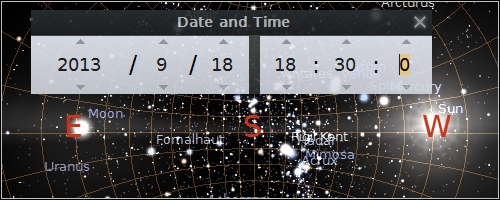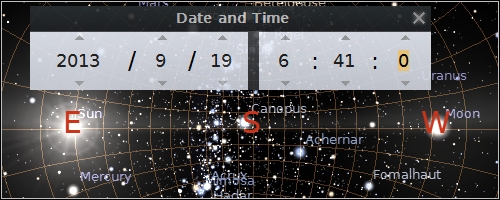The Sabbath Calendar.

Example Sabbath Calendar.
See Full Size Image HERE.
When Does A New Month Begin?
The Sabbath you observe, and calendar you
use to observe it, defines who you worship.
Blow the horn (proclaim) at The New Month ('chodesh' #2320), at The Full Moon ('keceh' #3677) on our feast ('chag' #2282) day. (Psalm 81:3) (Bible Lexicon).
So in other words we're told by The Psalmist Asaph, the conductor of King David's choir of the temple (1 Chronicles 16:7, 2 Chronicles 29:30) to Blow The Horn, (proclaim), The New Month, the night the The Full Moon rises. Then, everyone comes together to have a feast to The Holy One, from sunrise to sunset, called New Moon Day. As can be seen in the Creator's Calendar above, New Moon Day is always the first day of the Creator's month, following the rising of the New Full Moon.
When Does New Moon Day Begin?
As we have seen, New Moon Day is always the first day of the Creator's month, following the rising of the New Full Moon. Sometimes, due to bad weather, bad location, or just plain forgetfulness, we will miss observing the rising of the New Full Moon. That being the case, it is possible to observe when it will/did occur by using a planetarium program, and setting the time and date, to a time just prior to the expected event, and watching the program progress until that exact moment. Here we are using a program called Stellarium (available as a free download HERE, or a portable version HERE), to see these events.
The first event to look for, is the actual rising of the New Full Moon. As can be seen below, it always rises at sunset in the east, as the sun is setting in the west. On the evening before New Moon Day, the New Full Moon must appear visibly full above the eastern horizon, at or no later than 18 min after sunset:
Sunset
The evening before New Moon Day, the moon must appear visibly full
above the eastern horizon, at or no later than 18 min after sunset.
The next event to look for, happens at sunrise the next day, when you will observe the setting of the New Full Moon in the west. As can be seen below, it always sets at sunrise in the west, as the sun is rising in the east. Both the New Full Moon and the sun will be on or above the horizon, confirming that New Moon Day has commenced:
Sunrise
On the day of New Moon Day, the New Full Moon and the
Sun, will both be visible above or on the horizon at sunrise.
When Do The Six Work Days Begin?
Following New Moon Day, comes the six work days when man's work is to be done. In them you are to conduct the business of living, establishing yourself, your family, your security. You are to 'Create' whatever is your heart's desire, to prosper yourself and those around you.
But the seventh day is set aside (sanctified), for you to worship and commune with the Eternal Creator, to offer prayers of thanksgiving and supplication, to read from his word, and learn his ways.
What Day Is The Creator's Sabbath?
Remember the Sabbath day to sanctify it. Six days shall you work and accomplish all your work; but the seventh day is a Sabbath to the ETERNAL; you shall not do any work -- you, your son, your daughter, your slave, your maidservant, your animal, and your convert within your gates -- for in six days the ETERNAL made the heavens and the earth, the sea and all that is in them, and He rested on the seventh day. Therefore the ETERNAL blessed the seventh day and sanctified it. (Exodus 20:8-11).
There Are Three Types Of Days In Scripture:
Work Days.
(Exodus 20:9) (KJV) Six days shalt thou labour, and do all thy work...
Work Days are when man's work is to be done. In them you are to conduct the business of living, establishing yourself, your family, your security. You are to 'Create' (just as the ETERNAL did), whatever is your heart's desire, to prosper yourself and those around you. Since you were made in His image, and since He is a 'Creator', on these days, you should also be creative just as He is creative.
New Moons And Sabbaths.
Scripture clearly reveals, that in the eternal future, Yahweh will be worshipped on both types of days:
(Isaiah 66:23) (KJV) And it shall come to pass, that from one New Moon to another, and from one Sabbath to another, shall all flesh come to worship before me, saith Yahweh.
Moreover, scripture places New Moons together with the seventh-day Sabbath, as opposed to the other six working days:
(Ezekiel 46:1) (KJV) Thus saith the Sovereign Yahweh; the gate of the inner court that looketh toward the east shall be shut the six working days; but on the Sabbath it shall be opened, and in the day of the New Moon it shall be opened.
The fact that New Moons were to be kept free from buying and selling is established elsewhere in (Amos 8) where, again, the activity preformed on the New Moons, or in this case, the work abstained from on New Moons, is linked to the same restraint from work on the seventh-day Sabbaths. In this passage, Yahweh is speaking, pointing out the sins of Israel:
(Amos 8:4-5) (KJV) 4Hear this, O ye that swallow up the needy, even to make the poor of the land to fail, 5Saying When will the New Moon be gone, that we may sell corn? And the Sabbath, that we may set forth wheat, making the ephah small, and the shekel great, and falsifying the balances by deceit?
If work were allowed on New Moons, the backslidden people would not have been longing for the days of worship to be over so that they could go back to their buying and selling.
(Exodus 16) reveals that manna gathered on the Preparation day did not spoil when kept until the Sabbath, even though on every other day, it would spoil if they tried to preserve it until the next day. Exodus 16:23 further establishes the principle that food eaten on the seventh-day Sabbath is to be prepared the day before.
(Exodus 16:13-26) (NIV) 13That evening quail came and covered the camp, and in the morning there was a layer of dew around the camp. 14When the dew was gone, thin flakes like frost on the ground appeared on the desert floor. 15When the Israelites saw it, they said to each other, What is it? For they did not know what it was. Moses said to them, It is the bread the Lord has given you to eat. 16This is what the ETERNAL has commanded: 'Everyone is to gather as much as they need. Take an omer* for each person you have in your tent. 17The Israelites did as they were told; some gathered much, some little. 18And when they measured it by the omer, the one who gathered much did not have too much, and the one who gathered little did not have too little. Everyone had gathered just as much as they needed. 19Then Moses said to them, No one is to keep any of it until morning. 20However, some of them paid no attention to Moses; they kept part of it until morning, but it was full of maggots and began to smell. So Moses was angry with them. 21Each morning everyone gathered as much as they needed, and when the sun grew hot, it melted away. 22On the sixth day, they gathered twice as much, two omers** for each person, and the leaders of the community came and reported this to Moses. 23He said to them, This is what the ETERNAL commanded: Tomorrow is to be a day of sabbath rest, a holy sabbath to the ETERNAL. So bake what you want to bake and boil what you want to boil. Save whatever is left and keep it until morning. 24So they saved it until morning, as Moses commanded, and it did not stink or get maggots in it. 25Eat it today, Moses said, because today is a sabbath to the ETERNAL. You will not find any of it on the ground today. 26Six days you are to gather it, but on the seventh day, the Sabbath, there will not be any.
* One omer is approximately 3 pounds, or 1.4 kilograms.
** Two omers is approximately 6 pounds, or 2.8 kilograms.
There is no command given to not cook food on New Moons. Furthermore, there is no indication anywhere in scripture that food gathered on sixth day, Preparation, was to be held over until two days later. Neither is there any supernatural preservation of the manna indicated for New Moon day. Half of the time, the seventh-day Sabbath comes right before New Moon day. It is assumed, therefore, that manna fell on New Moon day and that it could be cooked, if so desired. Cooking is not considered work, as is buying and selling. Moreover, Feast days can fall on Work Days (The Feast of Unleavened Bread and The Feast of Tabernacles), New Moons, or Sabbaths.
Circumstantial support for this is found in (1 Samuel 20) where the practice of a family gathering together for a special meal on New Moon is recorded:
(1 Samuel 20:5) (KJV) So David said, "Look, tomorrow is the New Moon feast, and I am supposed to dine with the king; but let me go and hide in the field until the evening of the day after tomorrow."
(1 Samuel 20:18) (KJV) Then Jonathan said to David, "Tomorrow is the New Moon feast. You will be missed, because your seat will be empty".
Today, many use New Moon day as a special time of recommitment for the upcoming month. It is a day of looking back on the past month and rejoicing in blessings given while asking forgiveness for wrongs committed. It is also an opportunity to look ahead to the upcoming month. New Moon day is a wonderful time for gathering together with one's family and friends, and rejoicing in the blessings of heaven, while recommitting oneself and one's family to Yahweh.

Footnotes:
[1] [a]All scriptural links point to the Bible Gateway, A Searchable Online Bible In Over 100 Versions And 50 Languages, located at "BibleGateway.Com", a vast biblical resource containing all the major texts and reference materials useful for in-depth bible studies. Most scriptual quotations are from the (KJV) of the Bible, however versions noted in (parentheses) should also be consulted. [b]All Strong's scriptural references point to the Blue Letter Bible Lexicon, located at "BlueLetterBible.Org", another vast biblical resource which has over 4,000,000 links available, pointing to more than 165,000 pages of concordances, lexicons, dictionaries, commentaries, images, and several Bible versions.